India repeats firm 'no' to mediation in Kashmir dispute with Pakistan. Here's why
New Delhi's stand is that Kashmir can only be solved bilaterally by India and Pakistan.

Representational image
India was quick to turn down US President Donald Trump's offer to mediate between India and Pakistan on the Kashmir issue, and refuted his claim that PM Narendra Modi had asked for it. Observers, including American ones, immediately came out to say it was near impossible that an Indian PM had sought intervention in the Kashmir dispute.
India repeated it long-standing position that Kashmir is an issue that could only be solved bilaterally, in accordance with the 1972 Shimla Agreement and the 1999 Lahore Declaration.
The US State Department quickly softened Trump's remarks, and reiterated the US stand that Kashmir is a bilateral issue and that the US is willing to help in whatever way India and Pakistan seek.
India has held ever since the Shimla Agreement was signed that resolving the Kashmir was solely in the hands of India and Pakistan.
Here is a 10-point explainer on why India will not agree to third-party mediation:
- 1. Even as Indian forces beat back the Pakistani military and tribal militia invasion of Jammu and Kashmir to prevent it from joining India in 1947, India approached the United Nations over the issue. The UN passed Resolution 47 calling for a plebiscite. The first step towards the plebiscite was the withdrawal of all Pakistani troops from Jammu and Kashmir. This was to be followed by the withdrawal of a majority of Indian troops. Then, a referendum was to be held. However, Pakistan never took the first step.
- 2. The Shimla Agreement was signed by Prime Minister Indira Gandhi and Pakistan President Zulfiqar Ali Bhutto months after Pakistan's disastrous defeat in the Bangladesh Liberation War. As part of this treaty, India and Pakistan explicitly agreed to resolve differences peacefully through bilateral negotiations. The Shimla Agreement was ratified by the parliaments of both countries and became the sole treaty dictating India-Pakistan relations.
- 3. The next agreement between India and Pakistan on the conduct of their relations that is pertinent is the Lahore Declaration, which was signed by Prime Ministers Atal Bihari Vajpayee and Nawaz Sharif. Both countries committed to speeding up efforts to resolve the Kashmir dispute, and to implementing the Shimla Agreement in letter and spirit. The Lahore Declaration too was ratified by the parliaments of both India and Pakistan.
- 4. Simply put, India and Pakistan have signed and ratified an bilateral treaty. And, they affirmed their commitment to that treaty in another agreement, which too was ratified.
- 5. India holds that the signing and ratification of two bilateral agreements that explicitly mention Kashmir have rendered the United Nations's intervention null and void.
- 6. By that logic, there would be no need for either a plebiscite in Jammu and Kashmir or for the United Nations Military Observer Group in India and Pakistan (UNMOGIP).
- 7. Despite signing and ratifying one treaty committing to bilateral solutions to all disputes in 1972, and affirming that commitment in another treaty in 1999, Pakistan has tried to get other global powers involved in the resolution of the Kashmir dispute. Primarily, Islamabad has done this as a tactic to raise international attention and pressure on India.
- 8. Pakistan's tactic of trying to get other countries involved is born out of the same rationale that has seen it persistently support terrorism in Kashmir over the decades. The rationale is that ongoing attacks and India's military responses will help keep Kashmir in the global spotlight.
- 9. Pakistan's efforts at seeking mediation intensified after the humiliation and loss of international confidence during the Kargil Conflict in 1999. After the international consensus that the infiltrators were Pakistani military regulars, it could no longer claim that the violence in the region was part of an indigenous Kashmiri freedom movement.
- 10. Pakistan has resorted to the tactic of trying to drag other countries into the mix whenever it has found India taking a tough line. Previously, India has time and again suspended the bilateral dialogue, usually after a major attacks carried out terrorists based in and backed by Pakistan. This time, the tactic has seemingly come into play to counter the Narendra Modi government's refusal to hold any talks since the Pathankot attacks of 2016, which had come just days after he made an unscheduled stop in Lahore to meet then Pakistan PM Nawaz Sharif.